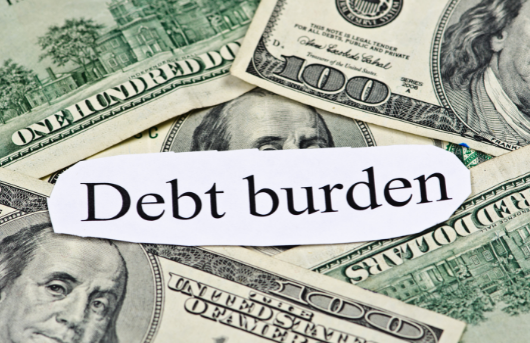
Managing Finances with a Terminal Illness
Updated: February 22, 2023
 Although most people are reluctant to think about it, estate planning is a crucial part of end-of-life finances. While you may think of estate planning as a way to protect your assets for your heirs, it is also about financial management for yourself. As detailed in Estate Planning, it is very important to start financial planning early, preferably well before you get sick.
Although most people are reluctant to think about it, estate planning is a crucial part of end-of-life finances. While you may think of estate planning as a way to protect your assets for your heirs, it is also about financial management for yourself. As detailed in Estate Planning, it is very important to start financial planning early, preferably well before you get sick.
While the Estate Planning section covers management of your financial assets for yourself and your heirs, this section will focus on managing finances when you have a terminal illness. As with a lot of financial matters, this can be complicated and you should consult a professional financial advisor.
Once you have been diagnosed with a serious or terminal illness it is best to start by making a list of your current assets and debts, such as loans, credit card bills, leased cars, mortgages, monthly bills, estimated tax payments, and outstanding medical bills. What you should do next depends on whether or not you have an estate plan.
- If you have not taken any of the steps outlined in Estate Planning, begin the appropriate steps now.
- If you have, you will need to update your plan and make changes in your financial management that will be the most beneficial for you and your family during your remaining time.
Your priorities will change dramatically when you have a terminal illness.
- Your financial plan will depend a lot on your prognosis, so it is helpful to get an estimate of the prognosis with health care providers to help determine what and how urgent these planning measures should be.
- This will only be an estimate based on others that have had your condition and your course may be significantly different.
- You can use the prediction as a starting place to adjust spending and make other decisions, but you will need to adapt the management of your finances based on your changing circumstances.
A terminal illness frequently increases your need for accessible funds, while simultaneously reducing your income. This could rapidly deplete your available funds and require you to seek other options.
- You can convert many liquid assets, such as stocks and marketable securities, U.S. Treasuries and bonds, mutual funds, and/or money-market funds to cash.
- You could consider selling your life insurance (viatical settlement), or borrowing against the equity in your home (reverse mortgage).
- While annuities and retirement accounts are primarily for providing a steady income after retirement, they can also be used in a difficult situation such as a terminal illness to increase your cash reserves for medical expenses. Many retirement accounts will waive penalty fees for early withdrawal if you are disabled or the money is used to pay medical expenses.
There are three likely scenarios you could be facing, each of which may require different approaches to investments.
- Progressive illnesses where there will be a limited period of steady decline. The situation will usually require ready access to money.
- Conditions like severe dementia, disabling stroke, ALS, or severe frailty where there will be a prolonged, indefinite, period of severe dysfunction that may or may not get steadily worse. This situation will usually require investment of some money for later use.
- Illnesses such as heart failure and COPD where function decreases irregularly, usually due to periodic and often unpredictable acute worsening of the illness, are more difficult to plan for. They often require investment of some money for later use.
The Financial Burden of Terminal Illness
While a terminal illness has a significant impact on your life, it also affects your finances. You may experience financial hardships from increased expenses, both medical and non-medical, and loss of resources.

Increased Expenses
Medical care is expensive and you often can’t depend on health insurance to cover it all. Additionally, there are other financial burdens related to being terminally ill. Your total expenses will depend on many factors such as your life expectancy, side effects of any treatment, the use of hospice or nursing homes, location of your death, and the amount of medical care delivered. Some of this you may have control over and you may be able to make choices that reduce your expenses.
The biggest expenses will likely be the medical cost of your treatment.
- These are usually out-of-pocket medical expenses like prescription copays, coinsurance for medical visits and treatments, and possibly medical equipment which may not be covered by your insurance.
- Aside from your copay for prescription drugs and covered medical supplies, you may need over-the-counter medications and supplies, which are usually not covered.
- Spending time in a long-term care facility such as a nursing home adds to your expenses if you have to pay part of the cost.
There are often overlooked expenses associated with serious or terminal illness and treatment that many forget to take into account.
- Your care may involve travel to medical visits, meals for you and/or your family when you are away from home, babysitters if you have children, or lodging for your family if you are in a hospital that is far away from home.
- If you need help with daily living and meals, you may need to hire home health aides to care for you and pay for other services such as physical therapy and/or visiting nurses.
- You may be spending more time at home which means that you are using more electricity, gas/oil, and water than normal.
- You may not be able to manage your finances, take care of your home, or manage other responsibilities and need to hire someone to do it.
- Being unable to pay some bills will result in higher interest payments. Talk to your creditors, they may be sympathetic to your situation and be willing to help you in some way.
 It is important to keep accurate records of these expenses since many of them may eventually be deductible, especially if the total costs go over 10% of your adjusted annual gross income. The same is true of any mileage involving travel to and from medical appointments.
It is important to keep accurate records of these expenses since many of them may eventually be deductible, especially if the total costs go over 10% of your adjusted annual gross income. The same is true of any mileage involving travel to and from medical appointments.
In addition to these expenses, it is important to consider how you are going to spend your remaining time to make it more meaningful. This may include spending money on your ‘bucket list,’ or anything that makes your life more enjoyable.
Finally, it is best if there is enough left over to pay for expensive funeral and burial costs.
Reduced Resources
Your terminal illness will likely reduce your resources. This will be largely your income from work since it is not uncommon for you to be unable to work, especially toward the end of your illness.
- You may have existing benefits through your work like group disability benefits from your employer or worker’s compensation that will help, but they are often not as high as your salary and may run out before the end of your life.
- You may possibly lose your job along with all of your income and any benefits, health and other insurance, and/or matching contributions that come from your employer.
Your household income may be reduced further if any family that is helping you has difficulty working full time or at all depending on the level of care you need.
Making Ends Meet
Keeping up with expenses may become difficult and every situation is different. You will need to find ways to cut expenses, have a ready source of funds, and make a plan for your family once you are gone that is best for your situation.
Spend Less
 If necessary, a good place to start is to reduce your personal expenses. It is the most common advice given by financial experts, but can be difficult to do. It’s hard to deny yourself some things when your remaining life is short.
If necessary, a good place to start is to reduce your personal expenses. It is the most common advice given by financial experts, but can be difficult to do. It’s hard to deny yourself some things when your remaining life is short.
- Some expenses may limit themselves. You may no longer be able to travel, go out for dinner, or pursue hobbies, which will save the money usually spent there.
- Sometimes it will take individual sacrifice for you and your family to decide on things that can be limited or done without.
Funeral and burial costs can be quite expensive, but there are ways to reduce them.
- You may be able to reduce the cost if you plan or even pay ahead of time.
- Avoid unnecessary funeral and burial costs by shopping around and avoiding expensive options.
- For details see Planning Ahead Can Lower Funeral Costs and Cemetery Costs
Make Investment Choices That Fit Your Situation
 How you make investments has a lot to do with your financial needs and resources, inheritance plans, and how early you started your estate planning.
How you make investments has a lot to do with your financial needs and resources, inheritance plans, and how early you started your estate planning.
- Higher risk investments usually have higher yields, but it takes longer for them to happen and there is always the possibility of losing money.
- As has happened recently, the stock market is very volatile on a day-to-day, week-to-week, or even month-to-month basis, but over the years the trend has been upward.
- If you invest in a start-up company, it may be years for the company to start making a profit and a significant percent of them fail.
- Lower risk investment usually have lower yields, but the gains are more dependable.
When you have a terminal illness, depending on your resources, your investment choices may be affected by the nature and prognosis of your illness.
- When you have adequate resources to pay for your medical costs and there is enough to leave to your heirs, you should invest more aggressively with the aim of earning higher yields over a longer term.
On the other hand, if you have a terminal illness and don’t have adequate revenue available, you don’t want to tie all of your money up in investments or make high-risk investments that might lose money.
- If you have a rapidly progressing illness you will most likely need the money for your current expenses and should have investments that are easily accessible, such as savings accounts and other liquid assets.
- If you have a slowly progressive illness you can expect to be needing resources to pay for medical costs for quite awhile. This may require some long-term investments with a higher yield to pay for those future medical expenses.
Resources to Tap for Funds
 It is important to have enough money available to pay your medical and other costs. While you may have some savings or money in your checking account you can use, many of your investments are not easily converted. This makes it difficult to access funds for paying bills.
It is important to have enough money available to pay your medical and other costs. While you may have some savings or money in your checking account you can use, many of your investments are not easily converted. This makes it difficult to access funds for paying bills.
There are basically two types of investments that can be used when you need to pay bills, liquid investments that are easily accessed for cash and convertible assets that can only be accessed in specific ways or for specific reasons such as a terminal illness.
Liquid Assets
If you have a terminal illness or are elderly and need money for living expenses/medical care, you will need cash, cash equivalents, or liquid investments that can be readily accessed.
- Stocks and marketable securities are considered liquid assets because they can be converted to cash in a relatively short period of time.
- U.S. Treasuries and bonds can be sold on the secondary market if you need money for medical expenses, although you will not get the full maturity price of the bond.
- Mutual funds are a managed portfolio of investments with money from various investors that is pooled and invested in a variety of different financial securities including stocks and bonds. They are considered liquid because you can sell your shares at any time and receive the money within days.
- Money-market funds are a type of mutual fund that invests in low-risk, low-yielding investments like municipal bonds that you can sell your shares in at any time.
In addition to funds to pay bills, you may want to convert other investments into enough liquid investments to pay for the potential cost of a private facility. You should talk to your money manager to see which of your investments is best to use.
Convertible Assets
In the case of a terminal illness, another possible source of funds is money you have saved for retirement. Annuities and retirement accounts can be a source of money depending on your age and under certain circumstances.
- After you are 59½ years old, annuities, IRAs, 401(k)s, profit-sharing plans, and other retirement accounts can be used without penalty, but you may only be able to withdraw enough to pay bills under certain conditions, including terminal illness.
- Before you are 59½ years old, your options depend on the type of account and may include borrowing from the account, accessing the account without penalty for hardships, or withdrawing money from the account and paying a penalty.
 Annuities
Annuities
If you have a terminal illness, you can use annuities without financial penalties if you planned ahead. You can add a rider to most annuities that allows for early withdrawals of necessary amounts if you experience certain qualifying life events, such as becoming disabled, developing terminal illness, or needing long-term care.
Even if you did not, you can still withdraw money. Although you will have to pay surrender fees, it could be worth it if you have no other resources and are not concerned about needing money for you and/or your spouse for retirement.
Retirement Plans
Most retirement accounts already have provisions that allow you to access funds if you have an urgent situation, often including terminal illness.
401(k), 403(b), 457(b), and profit-sharing plans
Some company sponsored retirement plans, 401(k), 403(b), 457(b), and profit-sharing plans allow you to borrow from your investments.
- For 401(k)s, 403(b)s, and profit-sharing plans, this can be up to 50% of your vested account balance or $50,000, whichever is less.
- If you have less than $10,000 in your account, you can borrow up to 100% of your account balance.
If you receive a loan from a 401(k), 403(b), or profit-sharing plan you should learn the details of the loan specific to your plan.
- Some plans do not allow you to contribute to the plan for a certain period after taking out a loan.
- Since you are borrowing your own money, you are paying interest to yourself.
- Your loan must be repaid within five years and is usually done through payroll deductions.
- Having less money in your account will usually reduce any market gains during the repayment period.
- You will be responsible for paying withdrawal fees if you don’t repay the loan in full or if you leave an employer prior to doing so.
If your employer decides to allow hardship distributions when the plan is set up, you can use 401(k), 403(b), and 457(b) plans to pay for the cost of a terminal illness or other urgent situations.
- The IRS requires you to first access all other available resources, including loans from your plan.
- Because of this, your employer will need proof that you have no other resources to meet your needs and will ask you for appropriate documentation.
401(k) and 403(b) plans have similar rules for hardship withdrawals. Refer to the “summary plan description” that is provided to you each year or ask your human resource department if hardship distributions are available and if a terminal illness is grounds to waive the early withdrawal penalty.
457(b) plans have a slightly stricter definition of when plans can be utilized for illness, although the diagnosis of a terminal illness would certainly qualify.
 You cannot take loans from any of your IRA or Simplified Employee Pension plans. However, there are circumstances that allow you to use the money penalty and tax-free and be able to withdraw enough to pay expenses. Consult a tax attorney or the IRS to be sure that you qualify.
There are three ways to make qualified withdrawals from your IRA accounts to use for disability and illness.
You cannot take loans from any of your IRA or Simplified Employee Pension plans. However, there are circumstances that allow you to use the money penalty and tax-free and be able to withdraw enough to pay expenses. Consult a tax attorney or the IRS to be sure that you qualify.
There are three ways to make qualified withdrawals from your IRA accounts to use for disability and illness.
- You can withdraw money from your IRA without penalty if your disability is “total and permanent” as determined by a physician and you cannot work for at least a year, or the condition will result in your death.
- You can pay for medical expenses out of your IRA if you have out-of-pocket medical expenses above 10% of your adjusted gross income — this includes both your and your families’ expenses.
- Your IRA can be used to pay for health insurance premiums for you and your family if you are unemployed and getting unemployment benefits.
- You can avoid income taxes and penalties on earnings you withdraw from your account if the withdrawal is made to a beneficiary or your estate to use after your death.
- You can avoid penalties (but not income tax) on earnings you withdraw:
- From the original contributions to your Roth IRA;
- Due to an IRS levy;
- Money made when you were a reservist, as defined by the IRS; and
- Funds made as part of a Substantially Equal Periodic Payment.
- This is usually done if you lose your career and therefore your major source of income.
- This basically locks you into taking at least one distribution per year for at least five years or until you turn 59½, whichever comes last.
- You usually set this up through a financial advisor or directly with you IRA institution.
- For a 10% early withdrawal penalty on the taxable portion of the money, you can withdraw Roth solo 401(k) contributions for other expenses at any time before then, as long as you’ve had the account for at least five years.
- This increase in income may limit your ability to deduct some health expenses.
- If you have no income other than from retirement plans, taking distributions will create income that medical expenses can be deducted against in the tax year.
Other Resources
If you and/or your family caretaker cannot work, you may qualify for support from the federal government or other sources.
Your reduced income may quality you for:
- Medicaid;
- Premium subsidies for health insurance;
- Supplemental Security Income (if 65 years old or older and are blind or disabled);
- Worker’s compensation; and/or
- Tax breaks you can talk to the IRS about.
Your diagnosis may allow you to get:
- Medicare (ALS or kidney failure);
- Social Security Disability (if you cannot work due to these specific impairments, medical conditions, and problems); and/or
- Disease-specific patient assistance programs, which you can search for at NeedyMeds.org.
Social Security Retirement Benefits
- If you are aged 62-65 years, you qualify for early benefits.
- Once you reach the retirement age for your year of birth you are eligible for full benefits.
If you are a parent and need to hire caretakers you may be able to qualify for child and dependent care tax credit.
You may have other resources you can use to pay bills, such as a health savings account, disability benefits from an employer long-term disability insurance, long-term care insurance, critical illness insurance, cancer insurance, mortgage protection insurance, or worker’s compensation from your employer.
Some life insurance policies are structured so that the death benefit can be partially paid out to you if certain health-related issues arise, including terminal illness. Typically the policy will include a rider offering a lifetime payout if you have a life expectancy of less than 24 months as certified by a physician. Life insurance can be used in other ways to withdraw money, such as:
- Borrowing against the policy;
- Exchanging it for an annuity; and/or
- Selling it as a viatical or life settlement to help pay bills. Consider this a last resort since you will get far less than the policy is worth, usually 20-30%, and the money will not be there for your family after you die.
You can consider using some of your home equity in the form of a reverse mortgage.
- A reverse mortgage is a loan that you borrow against your home’s equity.
- While you don’t pay back the loan, the amount is deducted from your home’s value to repay the lender when you sell your home, or becomes due when you pass away.
Using life insurance and home equity will reduce inheritance for your beneficiaries, but it is there if you need it.
You and your family may need to make sacrifices that increase income, such as overtime if you can work. You may need to sell possessions like a car or valuables such as art or jewelry.
After your death your family may qualify for Social Security Survivors Benefits.
When widows and widowers can qualify for benefits depends on their situation. Even divorced spouses qualify if your marriage lasted at least 10 years, less if they are still taking care of any of your children who are under age 16 or disabled.
- They can receive reduced benefits as early as 60 years old or full benefits beginning at full retirement age. If they qualify for retirement benefits on their own, they can switch to their own retirement benefit as early as 62 years old.
- Their survivors benefits can start as early as 50 years old if they’re disabled and their disability started before or within seven years of your death. If they are caring for your children, they can receive Social Security Disability benefits if their disability starts before those payments end or within seven years after they end.
- They are eligible for survivors benefits at any age if they have not remarried and if they take care of your children who are under age 16 or disabled. If they remarry after they reach 60 years old (50 years old if disabled), the remarriage will not affect their eligibility for survivors benefits.
- Widows, widowers, and surviving divorced spouses cannot apply online for survivors benefits. They should contact Social Security at 1-800-772-1213 (TTY 1-800-325-0778) to request an appointment.
Your unmarried children can receive Social Security Survivors Benefits if they are:
- Under 18 years old;
- Aged 18-19 years and attending secondary school full time; and/or
- Any age and have a disability that began before 22 years old.
The payout of survivor benefits is based on your earnings while you were alive and their age and disability status.
- A surviving spouse after full retirement will get 100% of your benefit amount.
- A surviving spouse 60 years old to full retirement age will get 71½ to 99% of your benefit amount.
- A surviving spouse who is disabled and aged 50-59 years will get 71½% of your benefit amount.
- A surviving spouse of any age, caring for a child under age 16 will get 75% of your benefit amount.
- Children under 18 years old (19 years old if still in elementary or secondary school) or disabled will get 75% of your benefit amount.
Reduce Income Tax
There are many ways that having a terminal illness can affect your income tax. The most obvious is that if you cannot work, you might be in a lower tax bracket.
Another way of reducing income tax is keeping track of all your and your families medical expenses that could be tax-deductible, including the date, description of the service, and your out-of-pocket cost. Find an efficient way to do this.
- You can write everything down or keep the information in a computer as a spreadsheet or in a specific app.
- You will need to keep all your receipts in a file folder and/or as images on your computer.
Items that will apply to most people with advanced illness include:
- Medicare B premiums or health insurance premiums not paid through work;
- Deductibles and coinsurance/copays;
- Uncovered medications;
- Alternative care treatments;
- Medical supplies such as bandages;
- Dental care;
- Lodging while travelling for care; and/or
- Transportation costs, including:
- Taxi, bus, and train fares;
- Ambulance costs; and/or
- Tolls, parking fees, and mileage if you use your own car.
Medical expenses qualify as a non-refundable tax credit. In the year of death, medical expenses may be claimed for any 24 month period including the date of your death, which were not claimed in a prior year.
The Internal Revenue Service may be able to make suggestions and help in other ways.
Resources
- Social Security Retirement Benefits. USA.gov.
- Social Security Disability Benefits. USA.gov.
- Social Security Survivors Benefits. USA.gov.
- Social Security Supplemental Security Income (SSI) Benefits. USA.gov.
- Top Questions About Social Security. USA.gov website. Updated: August 25, 2020.
- Who Is Eligible for SSI. Social Security website.
- Adams S. Five Steps to Take when Illness Interrupts Your Retirement Planning. Posted: November 17, 2021. Accessed: November 19, 2021.
- Amend P. 7 Practical Tips for Building (Or Rebuilding) Your Emergency Fund. AARP website. Updated: November 4, 2021. Accessed: January 19, 2022.
- Amend P. 10 Financial Moves to Make in Your 60s. AARP website. Updated: November 2, 2021. Accessed: January 19, 2022.
- Anspach D. What You Need to Know About 401(k) Loans Before You Take One. thebalance website. Updated: July 12, 2021. Accessed: November 19, 2021.
- Bell K, Orem T. Cobbs E, et al. Financial Concerns at the End of Life. Merck Manual website. Updated: November 2021. Accessed: November 19, 2021.
- Caldwell M. What Is a 403(b) Plan? thebalance website. Updated: October 5, 2021. Accessed: November 19, 2021.
- Dealing With Serious or Terminal Illness. HealthCare Guys website. Posted: July 3, 2019. Accessed: November 19, 2021.
- Dogen S. Preparing For Death: A Checklist For The Inevitable. Financial Samurai website. Posted: August 5, 2021. Accessed: November 19, 2021.
- End-of-Life Financial Planning: Handling a Terminal Illness Diagnosis. Fifth Season Financial website. Posted: December 27, 2017. Accessed: November 19, 2021.
- Exceptions to Tax on Early Distributions. IRS website. Updated: September 30, 2021. Accessed: November 19, 2021.
- Grimaldi J, Revels J, Kess. Planning During Terminal Illness. The CPA Journal website. Published: May 2018. Accessed: November 19, 2021.
- July W. Financial Hardship and Terminal Illness. Fifth Season Financial website. Posted: August 28, 2017. Accessed: November 19, 2021.
- Lazary L. Tough Talk: Terminal Illness And Your Finances. Debt.com website. Published: July 12, 2017. Accessed: November 19, 2021.
- Mercadante K. 3 Times it Makes Sense to Withdraw Retirement Funds Early. investorjunkie website. Updated: January 19, 2021. Accessed: November 19, 2021.
- McClanahan C. Save Money On Taxes At The End Of Life — How And Why It Matters. Forbes website. Published February 4, 2013. Accessed: November 19, 2021.
- McClanahan C. Using Retirement Plans For Cash During Advanced Illness. Forbes website. Published July 28, 2013. Accessed: November 19, 2021.
- Plan Loans. IRS website. Updated: May 4, 2021. Accessed: November 19, 2021.
- The Difference Between Social Security and SSI Benefits. Supplemental Security Income website. Updated: January 2020. Accessed: November 19, 2021.
